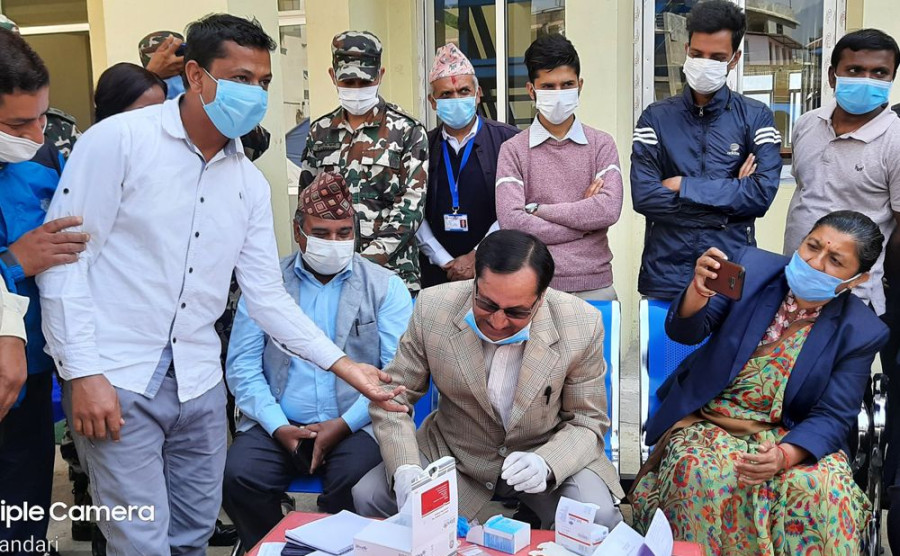Health
Provinces roll out rapid testing on all suspects and all those who’ve returned from India
As there are concerns about the efficacy of the test kits and the rapid testing method itself, PCR tests will be conducted on any positive samples, said the Health Ministry.
Arjun Poudel
After long weeks of pressure from the public and from public health experts, mass testing for Covid-19 among Nepalis suspected of harbouring the disease has finally begun.
Sudurpaschim Province began mass testing in Kailali and Kanchanpur on Thursday, using the rapid test kits imported from China by Omni Business Corporate International, a controversial private firm.
On Thursday, 66 tests were conducted in Kailali and Kanchanpur districts, with all the results negative, said Dr Bikash Devkota, spokesperson for the Health Ministry.
“Rapid tests have also begun in Baglung, Myagdi and Parbat districts,” said Devkota. “Tests will be performed on samples from all suspects and those who’ve entered the country recently and are in quarantine.”
The Health Ministry was unable to provide exact figures on the total number of people tested on Thursday.
A Cabinet meeting on Saturday had decided to conduct mass tests in three districts—Baglung, Kanchanpur and Kailali, where a majority of Covid-19 cases have been reported.
However, the veracity of those test results could be called into question, as rapid test kits imported from China have been found to be faulty and defective by a number of European countries. In order to ascertain their efficacy, the government had mandated the Nepal Health Research Council to test the kits with the assistance of the National Public Health Laboratory. Those tests have yet to be conducted.
Saturday’s Cabinet decision appears to have galvanised the Health Ministry to begin tests without awaiting the results of the kits themselves. But ruling party insiders believe that the test kits are being used to send a message that there was nothing wrong with the procurement of medical supplies from China, and to help exonerate Omni of any wrongdoing.
The Health Ministry is now preparing to employ the rapid test kits across the country, not just the three districts identified by the Cabinet.
“We have dispatched 5,000 rapid diagnostic test kits to each province,” Devkota said at a regular press briefing on Thursday. The government has around 75,000 rapid test kits, as part of the deal with Omni.
There are, however, concerns not just with the test kits but with the rapid testing method itself, which tests for a specific antibody in the blood.
According to Dr Anup Subedee, a consultant infectious disease physician, there are two antibodies in the blood that the rapid test looks for—immunoglobulin M (IgM) and immunoglobulin G (IgG). The IgM antibody, which is produced a few days after the onset of symptoms, is believed to fight the infection while IgG, which is produced at least a week after infection, provides longer-term immunity.
If someone has just been infected with the coronavirus, the rapid tests will not provide a positive response. But the tests can be useful in detecting the presence of the virus in asymptomatic cases.
According to Todd Pollack, assistant professor of medicine at Harvard Medical School, recent studies have shown that around 15 percent of people who are infected show no symptoms.
“Both PCR [polymerase chain reaction] tests and rapid blood tests have their own limitations,” said Subedee. “The presence of IgM means patients are suffering from an acute infection while the presence of IgG means the patient was infected at least some two weeks ago. The test can thus be useful in people who do not have symptoms but were infected. PCR tests also have their limitations and are not a gold standard.”
According to Devkota at the Health Ministry, the government will be conducting PCR tests on any samples that test positive on the rapid tests. It will not be announcing positive cases based solely on the rapid tests, said Devkota.
“It is good that the government is doing both,” said Subedee. “We will also know the validity, strengths and weaknesses of the test kits by performing both tests.”
The Health Ministry also said that 2,895 tests had been performed through polymerase chain reaction tests–2,382 by the National Public Health Laboratory and 513 by other nine laboratories set up outside the Kathmandu Valley until Thursday afternoon. Over 400 specimens—nasal and throat swabs of suspects—were collected from Jumla, Achham, Darchula and Baitadi, according to Devkota.




 20.12°C Kathmandu
20.12°C Kathmandu















